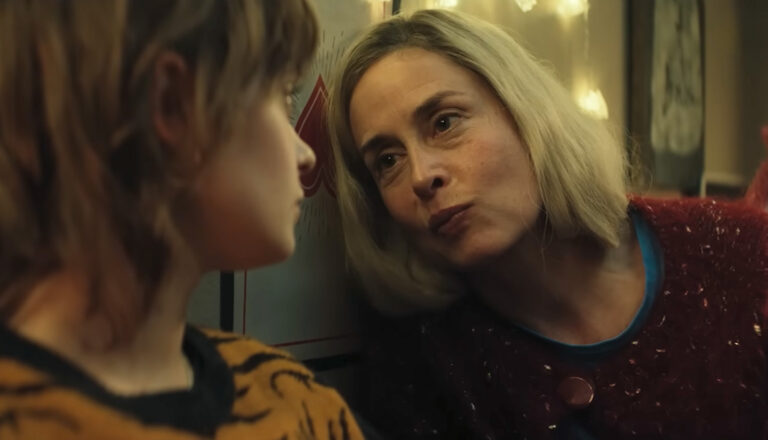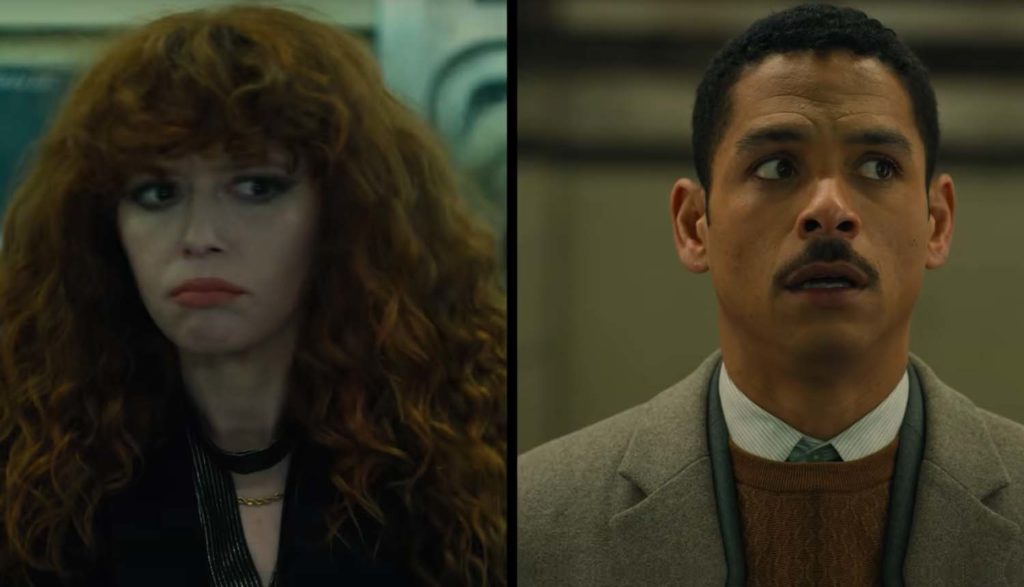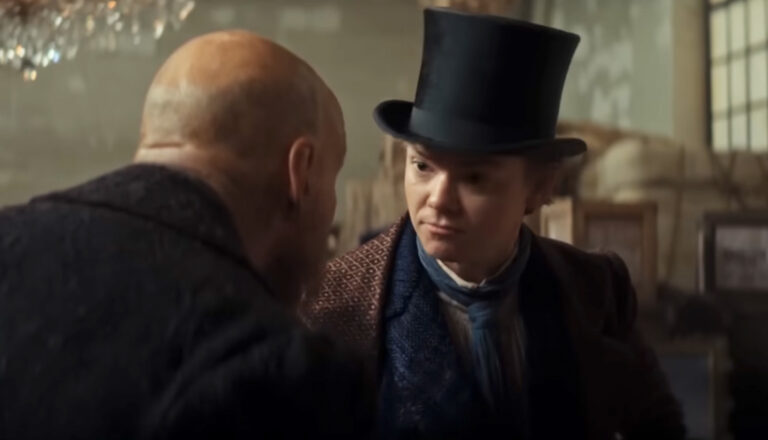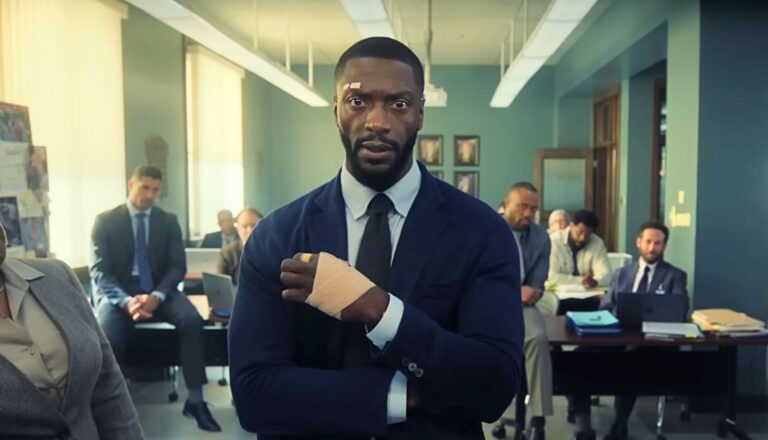
Unfamiliar
Filled with gritty violence and foul language, when it comes to this German spy drama, “unfamiliar” is how most viewers should stay.

Nadia’s dead. Or not. Or both. Or something. Or fish.
No, scratch that. She’s definitely not a fish, or a school of fish, or anything related to fish. Though this show does remind me of my favorite eighth-grade joke: “How many surrealists does it take to screw in a lightbulb?” “Fish.”
Also, regardless of Nadia’s state of life, something fishy is definitely going on.
Let’s take a page from Nadia’s own Russian Doll playbook and backtrack a bit.
Nadia’s problems—well, her current existential problems, at any rate—seem to have begun in the bathroom. It was her 36th birthday, and her friend Maxine was throwing her a party. She was tidying herself up in Maxine’s freakish, vaguely sexual powder room and readying herself to dive back into the fray.
And then, later that evening, she died. And she found herself staring at herself in that psychedelic bathroom mirror again.
And so began the pattern for the next stage in Nadia’s life (or lack thereof). Sometimes she would die a few minutes later, sometimes a few hours, sometimes she didn’t seem to die at all. No matter: She always wound back up in the very same bathroom at her very same birthday party.
Then she found out there was another guy in the loop with her—a dude named Alan. They didn’t know each other beforehand, but suddenly they were inextricably connected. Together, they figured out why they were looping like this, how to break said time loop and how to literally go on with their lives.
Or at least they thought they had.
It’s been four years since they escaped the time loop, and they still aren’t 100% sure how they managed it. So as a precaution, they always spend Nadia’s birthday together. You know, just in case something weird happens. Such as a time-traveling subway car that transports them back to 1982 in the bodies of their parents.
Yeah, that would certainly qualify as weird. Luckily, this time-prison is a bit easier to escape. They can return to 2022 anytime via the same subway car, but it begs the question: Why?
Who knows? Nadia and Alan are naturally flummoxed by these happenings—and by a great many other occurrences.
Are they trapped in some sort of multiverse? Are Nadia and Alan in a version of purgatory? Or did Nadia, as she initially suspects, just use a particularly virulent party drug? The answers unfold (or not) step by episodic step, folded in layers of symbolism and philosophy and metaphor and, oh yes, super-crude behavior.
Give credit to Russian Doll for one thing: It’s smart. This is not a Netflix series that its creators slapped together during a lunchbreak.
Even the show’s title has layers of meaning—much as a matryoshka doll has layers of … dolls. Just as Nadia’s ever-duplicating days suggest the “hatching” of a new nesting doll, so we grow to know Nadia better with each new iteration. Or perhaps with each new chance she’s given, she becomes someone else, in a sense, with each death opening to a new life and opportunity—hopefully one in which she’s a little better than before.
And just as Nadia encounters her own second chances, so the show painstakingly unpeels philosophical layers of its own, with a nugget of morality found at its innermost core. You see, this is, in some ways, a deeply spiritual story. Past sins and hurts are explored and reckoned with. Penance is asked for or exacted. It’s no coincidence, methinks, that the birthday party which started Nadia’s time-journey takes place in what used to be a school dedicated to Judaism. “[People] used to study the Talmud right where you’re standing,” Nadia tells one of the party’s revelers.
But just as Nadia begins to feel pretty weird about this hedonistic party being thrown in what used to be a “sacred place,” so Russian Doll takes its own ethical core and wraps it in layer after layer of problems.
Nadia, at least initially, treats sex as a rather aggravating pastime—a necessary, grimy respite in an even grimier existence. (She’s not alone: Hookups, including of the same-sex variety, are common.) She drinks and smokes and has no qualms about taking drugs (and apparently, neither did her mother when she was pregnant with Nadia): She brags, in fact, that her body has the “internal organs of a man twice my age.” And one of her friends marvels at her indestructability—calling her a cockroach. “It’s impossible to destroy you!” she says. Little does that friend know how right she really is.
The way Nadia goes about, um, restarting her day can get pretty graphic, too. She does not quietly fade away: Her spirit is wrested violently from her mortal coil via a car crash and a tumble down the stairs and any number of other painful passings.
Russian Doll is, like its namesake matryoshkas, compelling and mysterious and even darkly fun at times. But when it comes to the content we find here, this Doll most resembles Annabelle or Chucky: In other words, it’s pretty horrific.
Nadia travels to 1982 via a subway, where she soon learns that she has also been transported into the body of her pregnant mother, Lenora.
Nadia tells Alan about the time-travel and wonders if it’s an opportunity to right the wrongs of their parents’ pasts (since it also happens to be the year her mom lost their family fortune). And Alan soon makes his own journey to the past as well. Nadia also says the “universe” found something “worse than death” by placing her in the body of her mother. A woman says her shaman cured her carpal tunnel. Someone says that the religion of America is consumerism.
A topless woman dances at a bar. Nadia (in Lenora’s body) makes out with Chez, Lenora’s boyfriend, several times, intending to have sex (we see lots of groping and a shirtless Chez in one scene). Nadia says that Chez can’t be her father since her dad was an “alcoholic” not a “cokehead.” We hear some crude talk about sex and male and female genitals. We see Nadia’s and Lenora’s stomachs when Nadia raises her shirt to examine Lenora’s pregnant belly.
Before realizing that she is stuck in her pregnant mom’s body, Nadia drinks several shots of alcohol (with a confused look from the bartender). Chez feeds a pregnant Lenora several drugs (cocaine, biphetamine and methaqualone) and takes a few himself. And even after realizing Lenora is pregnant, Nadia smokes in her body. In her own body, Nadia toys with the idea of quitting but ultimately resorts to smoking as a coping mechanism. We see her drinking from a bottle of alcohol hidden in a paper bag. Nadia’s friends want an absinthe bar at her birthday party. Several people are referred to as “cokeheads.”
A man is roughly shoved around and threatened. We see a cut on a woman’s head from a car crash. Chez makes Nadia (as Lenora) help him steal gold from her mother’s house. He later robs her of that same gold. We hear a woman urinating offscreen. Nadia vomits.
We hear 50 uses of the f-word as well as the s-word, “a–hole,” “b–ch,” “d–k,” “pr–k,” “p-ss” and “p—y.” God’s and Christ’s names are also abused. And people make crude hand gestures.
At her 36th birthday party, Nadia freshens up inside a psychedelic bathroom. (It has a glowing blue object that may or may not be a depiction of the female anatomy on its door.) She exits the bathroom, smokes a joint laced with cocaine (offered by the party’s host) and hooks up with a man she meets there. They wind back at her place and, after they apparently have sex, she calls him an Uber and goes out to buy a pack of cigarettes. She sees her cat, Oatmeal (who’s been missing for three days) but, as she crosses the street to get to him, Nadia’s struck and killed by a taxi … and then finds herself back in the bathroom.
We see Nadia get hit: She bounces off the car’s windshield and slams onto the pavement, her lifeless, staring face covered with cuts. In multiple death scenes that follow, Nadia also falls over the side of a railing and drowns (and when she returns to the bathroom, she coughs up water all over the floor)l; and she nearly takes a tumble down a flight of stairs.
When Nadia meets the stranger at the party, they exchange a bit of talk before he roughly puts his hand in her pants and comments crudely about her anatomy. They leave the party, first stopping off at a grocery store so that the guy can pick up some condoms. We don’t see them have sex, but later, their conversation makes it clear they did. (He’s a teacher, and Nadia implies that he had flings with his students.) They engage in crude sexual banter elsewhere, including references to oral and anal sex. We see women kiss each other at Nadia’s party, and a of close friend talks about her lesbian relationship with a much younger woman.
Nadia smokes almost constantly (we see others smoke, too), and she talks frankly about some of the drugs she’s taken. Other people drink beer, wine and what appears to be whiskey. Characters roll and smoke cocaine-laced marijuana joints.
There’s some discussion about how the apartment where the party takes place used to be a “school for Jews.” When Nadia wonders whether the apartment owner frets about these sorts of parties in what used to be a “sacred place,” the owner quips, “This is New York. Real estate is sacred.”
Characters say the f-word about 30 times. We also hear four uses of the s-word, two misuses of God’s name and about four abuses of Jesus’ name. The word “b–ch” is also uttered.

Paul Asay has been part of the Plugged In staff since 2007, watching and reviewing roughly 15 quintillion movies and television shows. He’s written for a number of other publications, too, including Time, The Washington Post and Christianity Today. The author of several books, Paul loves to find spirituality in unexpected places, including popular entertainment, and he loves all things superhero. His vices include James Bond films, Mountain Dew and terrible B-grade movies. He’s married, has two children and a neurotic dog, runs marathons on occasion and hopes to someday own his own tuxedo. Feel free to follow him on Twitter @AsayPaul.

Filled with gritty violence and foul language, when it comes to this German spy drama, “unfamiliar” is how most viewers should stay.

Oliver Twist’s Artful Dodger isn’t 13 anymore: He’s an adult. And being an adult comes with more grown-up problems.

Though it’s compelling, the content concerns in Prime Video’s ‘Cross’ might be enough to cross it off your watch list.

‘The ‘Burbs’ is Peacock’s attempt to adapt the 1989 movie of the same name. But a fresh coat of paint doesn’t hide the content issues.